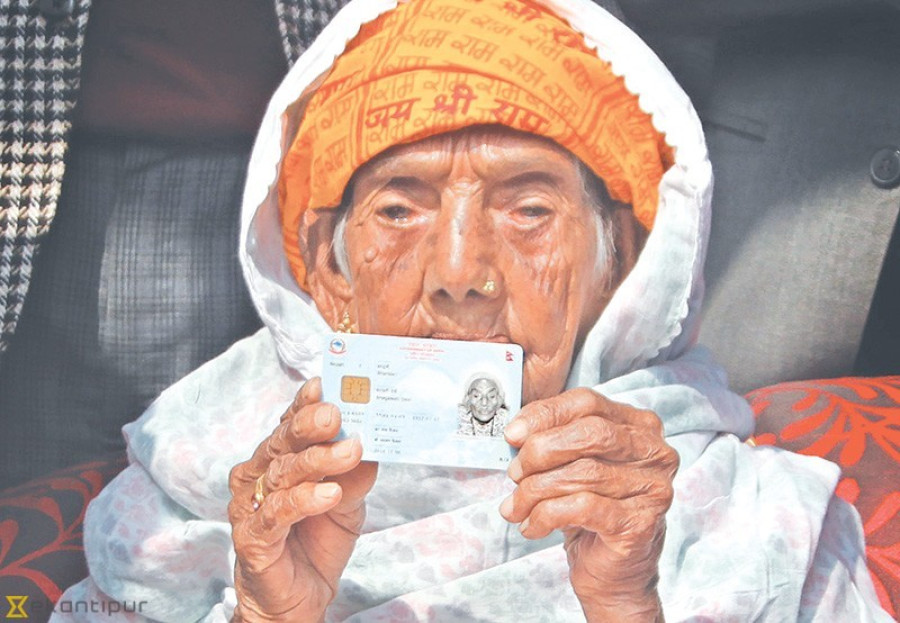National
Opposition lawmakers demand halt to National ID card distribution
At the parliamentary State Affairs and Good Governance Committee, lawmakers question the government why the cards were issued when the bill regarding the same is being discussed at the federal parliament.
Tika R Pradhan
Lawmakers from the main opposition Nepali Congress have demanded a halt to the distribution of National Identity card saying that it was issued without necessary legal basis and the contract for the National Identity Management Information System was awarded bypassing the mandatory competitive bidding process.
The lawmakers, who were discussing the bill on national identity card and civil registration, have also demanded the government furnish the reason behind awarding a contract without a competitive bidding process.
During the discussions on the national identity card at the parliamentary State Affairs and Good Governance Committee on Friday, lawmakers questioned the government why the cards were issued when the bill regarding the same was under discussion at the federal parliament. Registered at the lower house on January 4, the State Affairs Committee is holding clause-wise discussions on the bill. With the protests from the lawmakers, Friday’s discussion was halted for an hour.
NC leader and lawmaker Dilendra Badu went on to accuse the government of being involved in irregularities bypassing the competitive bidding process. “Why did the government allow preparation of the card going against the procurement law? The government must furnish clarification,” Badu told the meeting. Devendra Raj Kandel, another NC lawmaker, claimed that the government’s move was “childish”.
Circumventing the mandatory competitive bidding process for public tenders, the government had awarded the French company IDEMIA the contract for the National Identity Management Information System also without having to submit its performance security bond in full.
The government, late in the night of July 10, signed a $16 million (approximately Rs1.73 billion) contract to upgrade and manage the national identity card project with IDEMIA, without calling for a competitive bidding process, contravening the existing public procurement laws. According to public procurement laws, IDEMIA should have submitted the security bond in full, for the entire term of the contract, upon signing the contract.
NC lawmaker Amresh Kumar Singh, however, left the meeting saying that he would not discuss the national identity card, which is meant to replace the citizenship certificate among others unless the issue of citizenship was settled.
Also, some lawmakers from the ruling Nepal Communist Party (NCP) had supported the opposition lawmakers.
Some ruling party lawmakers including Jhapat Rawal had expressed ignorance over the issue of national identity card. While former Home Minister Janardan Sharma, in whose term the decision of issuing the card was made, said necessary laws regarding the card must be drafted soon. Another ruling party lawmaker, Pampha Bhusal, however, said the parliamentary committee should demand the government furnish the documents regarding the bidding process.
The agreement was signed on behalf of the government by Dipak Kaphle, director general of the Department of National ID and Civil Registration, and Shiva Nath Poudel, under-secretary at the Home Ministry, among others. For IDEMIA, Tim Ferris, senior vice president for Asia-Pacific, signed the contract on June 30 and assigned Wee Liang Tan, IDEMIA regional program director for Asia-Pacific, and other officials to seal the deal on July 10.
As per Clause 31 of the public procurement regulations, public entities have to procure goods, services or construction work valued above one million rupees through an open competitive bidding process.
However, Home Secretary Prem Kumar Rai defended the government’s move claiming that the works of the identity card were just a continuation of work from previous governments. “The works of national identity card have been going on for a decade and successive governments are just giving continuity to it,” Rai told the lawmakers. “The National Identity Card Management Centre was established by the government in 2009.”
Ten years since its inception, the National ID Management Center (NIDMC) under the aegis of the Ministry of Home Affairs started printing digital identity cards on November 1 last year. Secretary Rai had inaugurated the printing of the identity card from the personalisation centre at the Home Ministry.
The pilot project funded by the Asian Development Bank had initially aimed to distribute 117,000 electronic ID cards in Panchthar district and to civil servants serving at Singha Durbar.
The card will hold biometric data of each eligible Nepali citizen with a unique number. The proposed ID will replace the existing citizenship card. It will have personal data of family name, given name, address, father’s name, mother’s name, photo and four prints of both thumbs and two index fingers.
The biometric smart card, according to the centre, will have multiple applications and can be read with highly secure terminals and it will have background security features as well as software security.
***
What do you think?
Dear reader, we’d like to hear from you. We regularly publish letters to the editor on contemporary issues or direct responses to something the Post has recently published. Please send your letters to [email protected] with "Letter to the Editor" in the subject line. Please include your name, location, and a contact address so one of our editors can reach out to you.




 8.79°C Kathmandu
8.79°C Kathmandu















